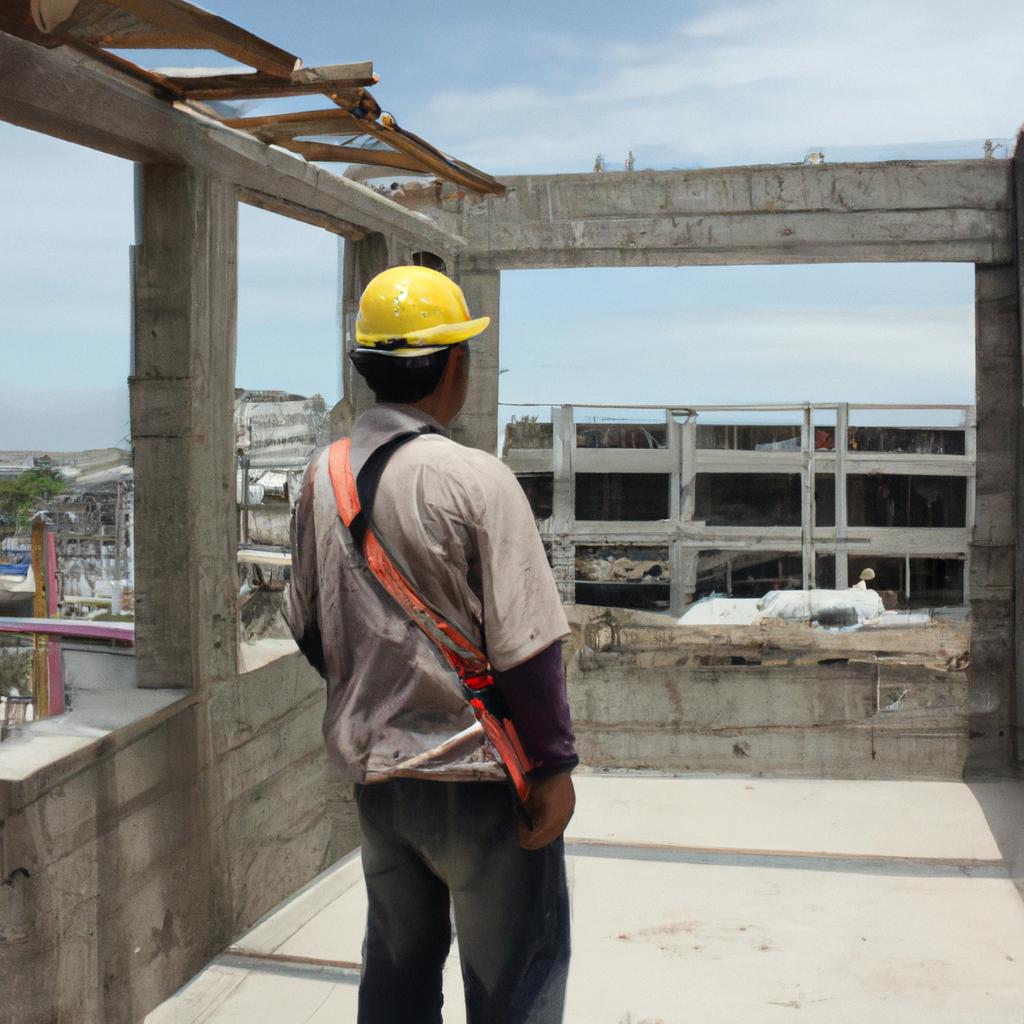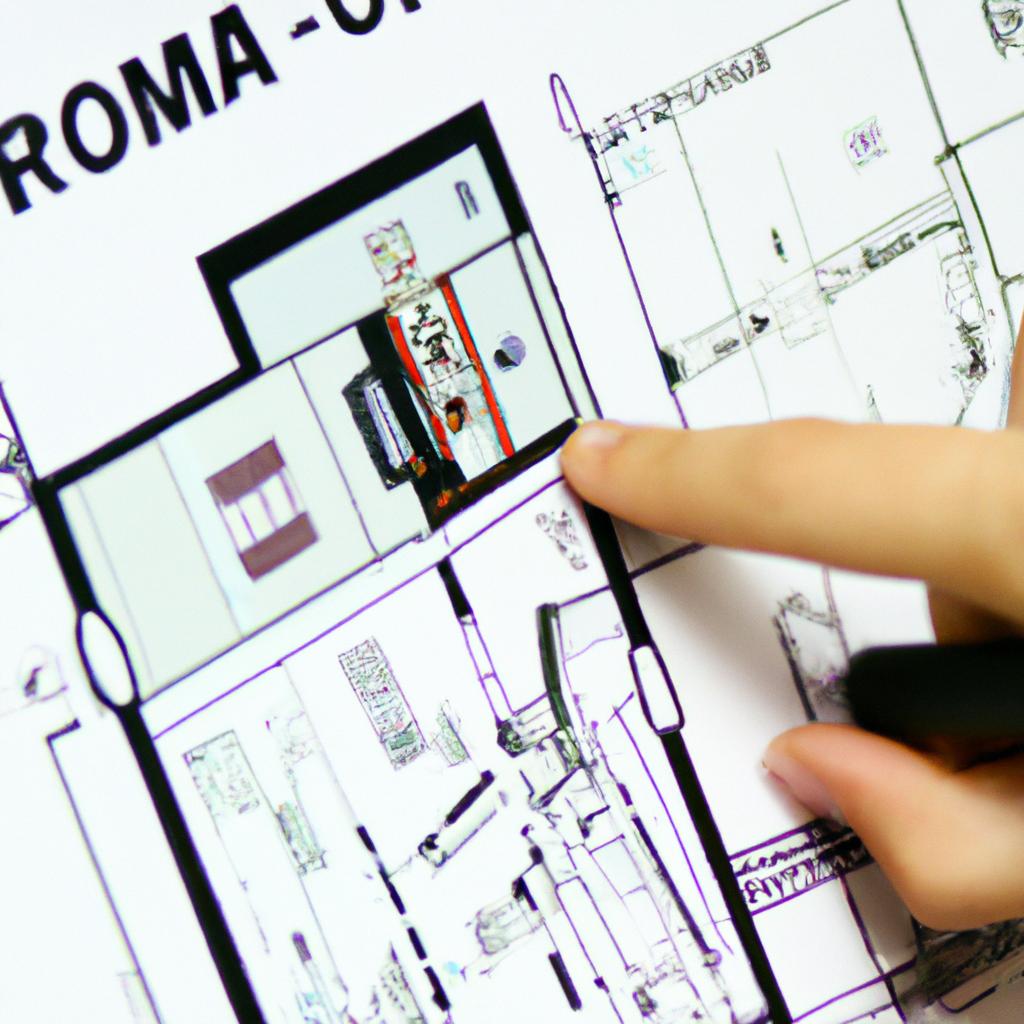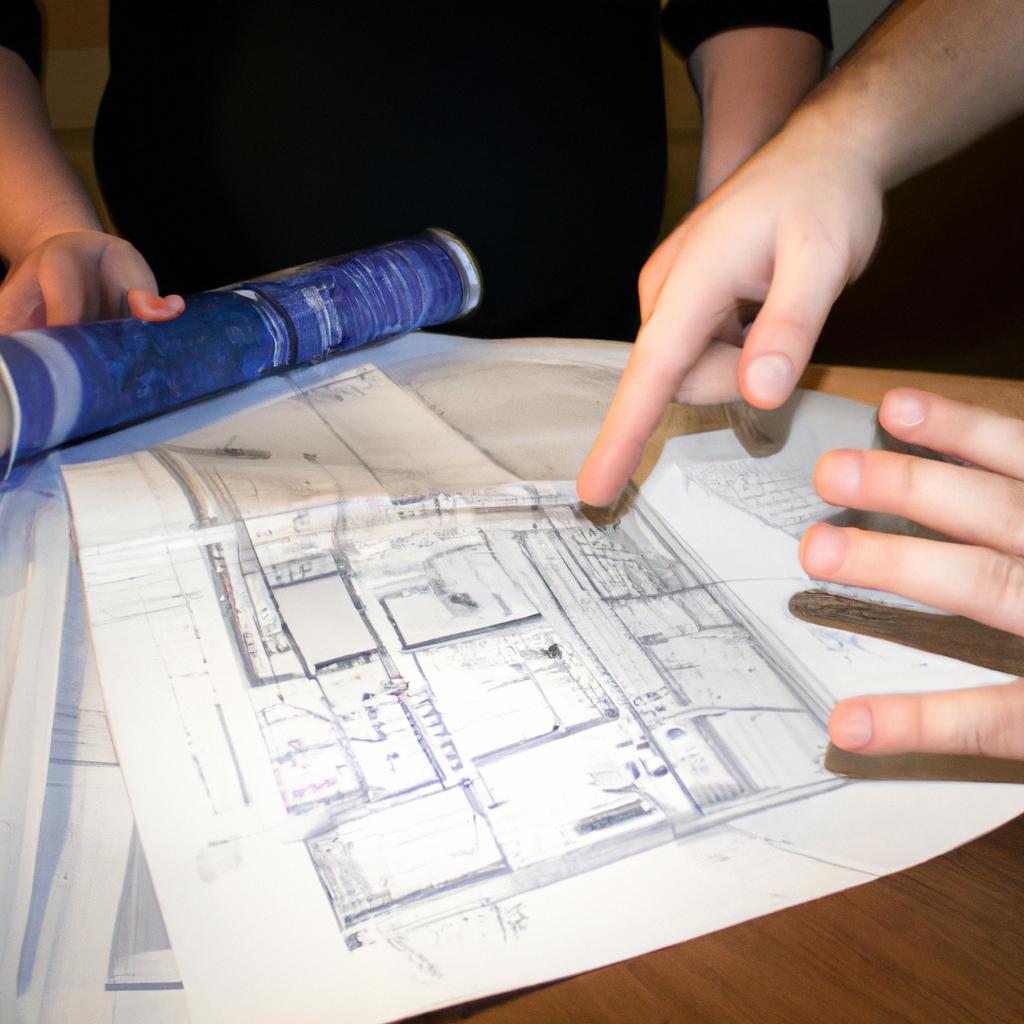The field of construction management plays a crucial role in the real estate business, particularly in property development. Effective and efficient management of construction projects is essential for ensuring the successful completion of developments within budget and on schedule. For instance, consider the case study of a hypothetical property development project involving the construction of a high-rise residential building. The implementation of effective construction management practices would be vital to oversee various aspects such as procurement, scheduling, quality control, and risk mitigation.
In this article, we will delve into the insights gained from studying construction management in the context of real estate business and property development. By understanding the intricacies involved in managing construction projects within the realm of real estate, professionals can enhance their decision-making abilities and improve overall project outcomes. This article aims to explore key concepts related to construction management in real estate, including planning and design coordination, cost estimation and control measures, as well as effective communication strategies among stakeholders. Additionally, it will shed light on industry best practices that contribute to successful project execution while mitigating potential risks associated with these ventures.
Understanding the Role of Construction Management in Real Estate
Construction management plays a crucial role in the successful execution of real estate projects. It involves overseeing and coordinating various activities, ensuring that construction projects are completed on time, within budget, and to the desired quality standards. To illustrate this role, let us consider the case study of a hypothetical property development project called “Greenville Heights.”
In Greenville Heights, construction management was instrumental in managing multiple aspects of the project. Firstly, it involved coordinating with architects and engineers during the design phase to ensure that plans met all regulatory requirements and aligned with the client’s vision for the development. Secondly, construction managers worked closely with contractors and subcontractors to facilitate efficient resource allocation and scheduling of tasks. This helped streamline operations and mitigate potential delays.
To further highlight the significance of construction management in real estate projects, here is a bullet point list showcasing key responsibilities:
- Planning and organizing: Construction managers create comprehensive project plans outlining timelines, budgets, and resources required.
- Risk assessment: They identify potential risks such as weather conditions or material shortages that could impact construction progress.
- Quality control: Ensuring adherence to building codes and regulations while maintaining high-quality standards throughout the project.
- Communication and coordination: Facilitating effective communication among stakeholders including clients, designers, contractors, suppliers, etc., promoting collaboration towards project objectives.
Additionally, an emotional response can be evoked through visual representation. Here is a table illustrating some advantages associated with incorporating construction management into real estate projects:
| Advantages | Description |
|---|---|
| Improved cost control | Allows better monitoring of expenses |
| Enhanced efficiency | Streamlines processes for timely completion |
| Minimized risk | Identifies potential issues before they occur |
| Superior quality assurance | Ensures compliance with industry standards |
As we have seen from our discussion on the role of construction management in real estate using Greenville Heights as an example, it is evident that effective construction management practices are essential for successful property development. In the subsequent section, we will explore key factors to consider in construction management for property development projects, focusing on strategies and considerations that contribute to project success.
[Transition Sentence] Now let us delve into the key factors to consider in construction management for property development, exploring various aspects that require careful attention and planning.
Key Factors to Consider in Construction Management for Property Development
In recent years, the role of construction management has become increasingly crucial in the real estate industry. To illustrate this point, let’s consider a hypothetical scenario where a property development company is undertaking the construction of a high-rise residential building. The successful completion of such a project requires effective coordination and oversight throughout various stages, starting from initial planning to final delivery.
To ensure efficient execution, several key factors need to be considered in construction management for property development:
-
Project Planning: Thorough planning sets the foundation for any successful construction project. It involves assessing feasibility, defining objectives, establishing timelines, and creating detailed strategies outlining each phase of construction. A clear plan serves as a roadmap for all stakeholders involved and ensures that resources are allocated effectively.
-
Risk Assessment and Mitigation: Construction projects inherently carry risks that can impact timelines, costs, and overall success. Therefore, conducting comprehensive risk assessments becomes imperative. Identifying potential hazards or obstacles allows proactive measures to be taken to mitigate them effectively while ensuring safety protocols are followed diligently.
-
Quality Control: Maintaining high-quality standards throughout the construction process is paramount to deliver an exceptional end product. Implementing rigorous quality control procedures helps identify defects early on, enabling prompt corrective actions before they escalate into larger issues.
-
Cost Management: Effective cost management plays a pivotal role in ensuring financial viability and profitability of real estate projects. Close monitoring of expenses, accurate estimation of budgets, diligent procurement practices, and adherence to predetermined financial plans contribute significantly towards achieving desired outcomes within budgetary constraints.
Emphasizing these factors not only enhances efficiency but also minimizes risks associated with property development projects. By implementing robust construction management practices encompassing meticulous planning, risk assessment/mitigation techniques, stringent quality controls, and prudent cost management strategies; developers can maximize their chances of delivering successful ventures that fulfill market demands.
Moving forward into our discussion on “Planning and Budgeting in Construction Management for Real Estate Projects,” we will explore the importance of effective planning and budget allocation to ensure successful outcomes.
Planning and Budgeting in Construction Management for Real Estate Projects
Transition from the Previous Section:
Having discussed the key factors to consider in construction management for property development, it is now crucial to delve into the next essential aspect of this process—planning and budgeting. To further enhance our understanding, let us explore a hypothetical scenario involving the construction of a residential complex.
Section Title: Planning and Budgeting in Construction Management for Real Estate Projects
In order to successfully execute a real estate project, meticulous planning and effective budget allocation are paramount. Let’s consider the hypothetical example of constructing a residential complex consisting of multiple buildings with varying unit sizes. The first step in planning would involve conducting thorough market research to assess demand and identify potential target demographics. This information is invaluable during the design phase, as it helps determine optimal building layouts that cater specifically to the identified buyer preferences.
The emotional bullet point list:
- Increased efficiency leading to timely completion
- Cost savings through accurate estimation
- Minimization of risks associated with unforeseen expenses
- Enhanced transparency throughout all project stages
One approach to effectively manage planning and budgeting is by utilizing various tools such as spreadsheets or specialized software programs designed specifically for real estate projects. These tools enable stakeholders to create detailed cost estimates based on itemized breakdowns for labor, materials, permits, and other necessary resources. By leveraging these technologies, developers can accurately forecast costs at different stages of construction while considering inflation rates and market fluctuations.
To better illustrate how planning and budgeting impact construction management outcomes, we present an informative table:
| Stage | Key Activities | Considerations |
|---|---|---|
| Pre-construction | Conceptualizing architectural designs | Community needs assessment |
| Procuring required permits | Government regulations | |
| Securing financing options | Market trends | |
| Construction | Mobilizing equipment and personnel | Safety protocols |
| Executing construction tasks | Quality control | |
| Post-construction | Inspecting completed work and addressing any deficiencies | Client satisfaction |
| Handing over possession to buyers | Legal obligations |
By adhering to a well-planned budget, developers can ensure that all aspects of the project are adequately funded, thus minimizing unexpected cost overruns. Additionally, effective planning enables efficient resource allocation and scheduling, which ultimately leads to timely completion and enhanced client satisfaction.
Transition Sentence:
With the foundation of proper planning and budgeting laid down, it is now imperative to explore effective communication strategies in construction management for real estate projects.
Effective Communication Strategies in Construction Management
Transitioning from the previous section on planning and budgeting, it is crucial to understand that effective communication strategies play a pivotal role in successful construction management for real estate projects. Clear and concise communication ensures smooth coordination between various stakeholders involved in the project, leading to improved efficiency and timely completion of tasks. To illustrate this point, let’s consider a hypothetical case study where a property developer engages with multiple contractors and subcontractors for the construction of a residential complex.
In such a scenario, effective communication can be achieved through several strategies:
-
Regular Meetings: Conducting regular meetings with all parties involved provides an opportunity to discuss progress, address concerns, and clarify any ambiguities. These meetings serve as a platform to align objectives, establish timelines, and allocate resources effectively.
-
Transparent Documentation: Maintaining accurate records of all communications related to the project helps in minimizing misunderstandings or disputes. Documenting important decisions, change orders, and approvals provides clarity and accountability throughout the construction process.
-
Utilizing Technology: Leveraging technology tools like project management software or collaboration platforms facilitates seamless sharing of information among team members. This streamlines workflows, enhances transparency, and improves overall productivity.
-
Active Listening: Encouraging open dialogue allows for better understanding of individual perspectives and challenges faced by different stakeholders. Actively listening to concerns fosters trust and encourages collaborative problem-solving approaches.
To further emphasize the significance of effective communication in construction management, consider the following table showcasing potential consequences arising from poor communication:
| Consequence | Impact |
|---|---|
| Misinterpretation | Delays in decision-making |
| Lack of Coordination | Increased rework |
| Incomplete Information | Budget overruns |
| Conflict Resolution | Stalled progress |
By implementing strong communication strategies while managing real estate construction projects, developers can mitigate these risks and achieve favorable outcomes for all parties involved.
Transitioning into the subsequent section on managing risks and challenges in construction projects, it is important to recognize that effective communication acts as a foundation for addressing potential hurdles. By employing suitable risk management techniques and problem-solving approaches, real estate developers can navigate challenges successfully while ensuring project success.
Managing Risks and Challenges in Construction Projects
Building on the effective communication strategies discussed earlier, successful construction management also involves effectively managing risks and challenges. Let’s explore some key aspects of risk management in construction projects.
One example that highlights the importance of risk management is a hypothetical scenario where a construction project faced unexpected delays due to inclement weather conditions. This resulted in increased costs, missed deadlines, and frustrated stakeholders. To mitigate such risks, it is essential for construction managers to anticipate potential challenges and develop proactive strategies.
To effectively manage risks in construction projects, consider the following:
- Conducting thorough risk assessments before starting any project.
- Developing contingency plans to address unforeseen circumstances.
- Regularly monitoring progress and addressing issues promptly.
- Maintaining open lines of communication with all parties involved.
In order to gain a better understanding, let’s examine a table highlighting common risks in construction projects along with their corresponding mitigation strategies:
| Risk | Mitigation Strategy |
|---|---|
| Unforeseen site conditions | Perform detailed site surveys before commencing work |
| Availability of skilled labor | Develop relationships with reliable subcontractors |
| Budget overruns | Implement strict cost control measures |
| Safety hazards | Adhere strictly to safety protocols |
These examples illustrate how risk management can help minimize disruptions and ensure smoother project execution. By proactively identifying potential risks and implementing appropriate mitigation strategies, construction managers can increase the likelihood of successful outcomes.
As we have explored the significance of managing risks and challenges in construction projects, our next section will delve into another critical aspect of construction management – the importance of quality control.
The Importance of Quality Control in Construction Management
Having discussed the various risks and challenges associated with construction projects, it is crucial to delve into another important aspect of construction management – quality control. Ensuring high standards of quality throughout the construction process is vital for successful property development. This section will highlight the significance of quality control in construction management and its impact on project outcomes.
Example (Case Study):
To illustrate this point, let us consider a hypothetical scenario where a real estate developer embarks on constructing a residential complex. During the early stages of construction, poor quality workmanship goes unnoticed due to inadequate quality control measures. As a result, structural issues emerge later on, leading to significant delays and additional costs required for rectification. Such costly consequences could have been avoided with effective quality control practices.
Importance of Quality Control:
-
Minimizes Defects and Errors:
Implementing rigorous quality control processes helps identify defects and errors during different phases of construction. By conducting regular inspections and tests, potential issues can be detected early on, enabling prompt corrective actions before they escalate into major problems. -
Enhances Customer Satisfaction:
High-quality construction not only ensures durability but also enhances customer satisfaction. Homebuyers often prioritize properties built with superior craftsmanship as they provide peace of mind regarding long-term maintenance requirements. Meeting or exceeding customer expectations through proper quality control measures contributes to positive word-of-mouth referrals and strengthens the reputation of developers. -
Improves Cost Efficiency:
Investing in quality control procedures upfront may seem like an additional expense; however, it ultimately leads to cost savings in the long run. Detecting and fixing defects earlier reduces rework expenses that would have otherwise occurred at later stages when rectifications become more time-consuming and expensive. -
Establishes Safety Standards:
Quality control measures also play a crucial role in ensuring the safety of both construction workers and future occupants. By adhering to industry standards, conducting regular safety inspections, and employing proper risk management strategies, potential hazards can be identified and mitigated effectively.
| Benefits of Quality Control |
|---|
| Minimizes defects and errors |
| Establishes safety standards |
In summary, quality control is an indispensable aspect of construction management in real estate business. It not only prevents costly mistakes but also enhances customer satisfaction, improves cost efficiency, and establishes safety standards at construction sites. By incorporating stringent quality control practices throughout the project lifecycle, developers can ensure successful property development with minimal risks or issues that could hamper project progress or compromise the final product’s quality.




